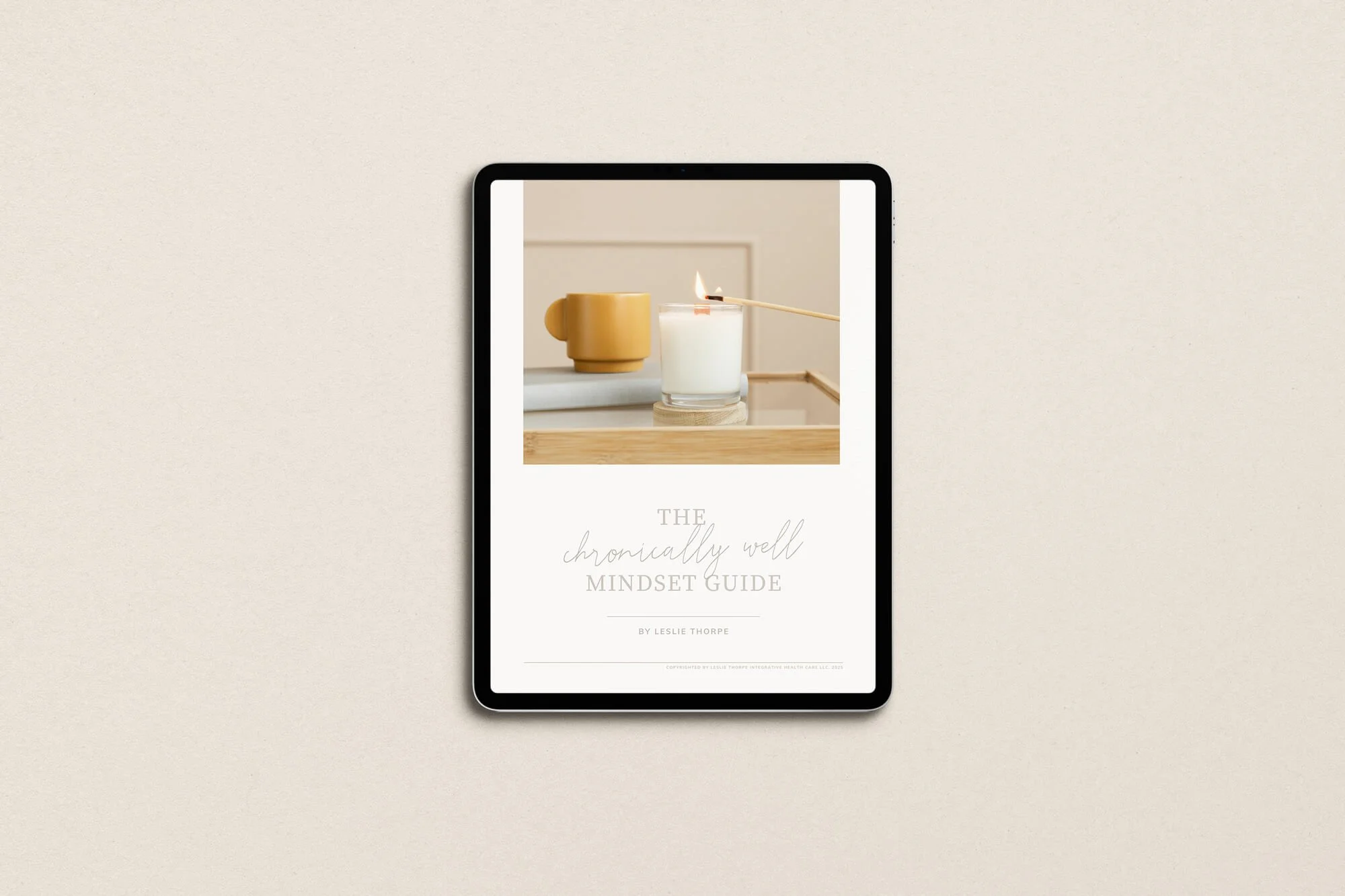From Grief To Acceptance: Finding Your Chronic Wellness Balance
Experiencing both the grief of what life was before a chronic condition, and the acceptance of what it can be while living with it, is a powerful step toward finding your balance with chronic illness.
Living with a chronic illness often presents the challenge of finding balance, a journey that involves both emotional and practical adjustments. One of the most significant hurdles is grieving the life we once knew while learning to accept a "new" normal.
This process can uncover tensions as we navigate the dual task of letting go of past expectations and embracing necessary changes.
In this blog post, we'll explore the importance of acknowledging this grief, the transformative power of acceptance, and offer empathetic guidance with actionable strategies to help you on your path to living well with chronic illness.
Understanding the Chronic Wellness Balance
The impact of chronic illness is not just limited to a medical diagnosis - it can affect all areas of your life. Navigating this impact can be challenging.
But, because we are living with a condition that is by definition not going away anytime soon, it is important to find a balance with chronic illness if we want to optimize our quality of life.
Finding that balance can be a challenging tightrope walk. We strive to live well - not just despite our conditions - but, alongside them, fully and unapologetically. Part of that balancing act is navigating grieving what life looked like before chronic illness while accepting the new realities of life with chronic illness.
What is Chronic Wellness?
Chronic Wellness is finding a balance in your life that allows you to manage your day-to-day with chronic illness while working towards and maintaining hope for future healing.
This entails some radical acceptance of the realities of the practicalities of your situation - and, your parameters. It also entails not giving up on yourself or your body. It requires finding the balance that works for YOU.
For more reading about finding your Chronic Wellness Balance, I invite you to read more HERE.
Tips for Navigating the Tension Between Grief and Acceptance While Finding Your Chronic Wellness Balance
Give Yourself Space To Feel Grief
Navigating life with a chronic illness can feel like a profound shift in reality, often leaving you yearning for the life you lived before. It's perfectly normal to grieve your pre-chronic illness life and the expectations you had. Allowing yourself to experience emotions without judgment is a vital step toward healing.
Grief isn't a sign of weakness; it's an acknowledgment of change and loss. Many of us attempt to maintain our old routines and goals, hoping to keep life as it was. While that seems a lot like denial, it's doesn’t mean you are stuck in it.
Trying to maintain old expectations is part of the process of coming to terms with our new realities. There is no other way to sort out the difference between the past and the present than by experiencing what life looks like now and how that is different than before. Recognizing what no longer works for us and grieving these changes can pave the way for acceptance and adaptation.
To manage these emotions constructively, consider incorporating mindfulness practices into your daily routine. Journaling can help process feelings, while therapy provides a safe space to explore your grief with professional guidance. Personal stories from others who have walked this path can also offer comfort and insight. Whether you find these in a chronic illness community or by reading about other's experiences, you can gain insights and ideas that you find supportive.
Remember, your emotional well-being is just as important as your physical health. By giving yourself permission to grieve, you open the door to finding a new balance and a more fulfilling life despite chronic illness.
For more reading about feeling the feelings of frustration and grief, I invite you to this BLOG POST.
Trust Yourself and Your Mind/Body
Living with a chronic illness can feel overwhelming, but within you lies an internal guide—your intuitive voice. Trusting this voice is crucial, as it intimately understands your unique body, mind, and spirit. Embracing your inner expert empowers you to develop a lifestyle that truly supports your well-being.
Listen to Your Body
Your body speaks its own language, communicating fatigue, discomfort, and energy. By listening closely, you can better manage your condition. These signals guide you toward choices that nurture your strength rather than deplete it.
The Importance of Self-awareness
Self-awareness lets you respond to your true needs by acknowledging your symptoms, triggers, and daily experiences. This understanding empowers you to make informed decisions that provide control and ease in managing your illness.
Creating a Nurturing Lifestyle
Your inner expert, armed with personal insights, helps you build a lifestyle that honors your experiences and aspirations. This tailored approach respects your boundaries and potential, fostering a fulfilling life despite challenges.
Living well with a chronic illness involves patience and practice. By trusting yourself and listening to your body, you nurture a holistic path to well-being. Your inner expert is your greatest ally—give it the attention it deserves.
For related reading, I invite you to follow the link to my blog post: Embracing Your Inner Expert To Live Chronically Well.
Let Go of Pre-Chronic Illness Expectations
One of the most vital steps toward living a balanced and fulfilling life is letting go of pre-chronic illness expectations. When you do that, you create space to redefine your goals to align with your current capabilities. This doesn't mean giving up on your dreams; rather, it's about adjusting them, or the steps you take to get there, to fit your new reality.
Releasing unrealistic expectations allows you to focus on what truly matters—your health and well-being. Start by acknowledging and reframing your thoughts. Instead of dwelling on what you can't do, shift your focus to what you can achieve. Set small, achievable objectives that provide a sense of accomplishment and purpose.
Remember, it's okay to grieve the loss of your previous lifestyle. But, at some point, it becomes important to empower yourself to take action as you are now. That will allow you to create space for self-care and healing.
ACCEPT YOUR PARAMETERS
Living with a chronic illness often requires recalibrating how you approach daily life. It's not easy to accept the limitations imposed by your condition, but doing so is crucial for finding fulfillment and purpose. Instead of battling against your parameters, imagine working within them to build a life that meets your current needs.
One key strategy is setting realistic expectations. By aligning your goals with what’s feasible for your energy levels and symptoms, you can reduce frustration and cultivate a sense of accomplishment. This process demands an honest inventory of your abilities and a willingness to adjust your lifestyle accordingly—without resentment or self-criticism.
Self-compassion lies at the heart of this acceptance. It involves recognizing your efforts as valid and valuable, even if they seem small compared to pre-illness days. Celebrate the progress you make and give yourself grace on tougher days.
Remember, accepting your illness doesn’t mean giving up hope; it means honoring where you are while opening doors to new possibilities for living well.
For related reading, check out my blog post on Accepting The Practicalities of Chronic Illness HERE.
Find YOUR Chronically Well Mindset
Check out my Chronically Well Mindset Guide. It is your companion to transforming how you live and think about life with chronic illness.
My Story
Personally, it took me years to listen to what my body was saying to me. Let's say my self-awareness score was about a 2 on a scale of 1 to 10. I was exhausted and kept getting sick. I was creating worse health by trying to hold on to the expectations I had prior to chronic illness.
But, I FINALLY started to listen to my body despite my deep desire to ignore it. At some point, my thought pattern changed. I decided to experiment with listening to my body rather than avoiding the messages. I simplified my life and started to prioritize rest and stress reduction. This changed the game for me and opened the door for me to engage in more nourishing practices. And, that opened the door to more healing.
While it has been a slow process, I stopped getting so sick as often. I started to prioritize my wellness, and I started to peel back layers of illness that had previously seemed impossible to overcome. And, now I am living with a better quality of life than I ever have.
While I can't promise that you will be able to peel away your illness, I can promise you that you will find a better way to live with chronic illness when you listen to your mind/body more.
For more about my Chronically Well story, you can read it HERE.
In conclusion, as you explore your way to find chronic wellness balance, it's essential to remember that the journey of balancing grief and acceptance is uniquely yours.
This process is continuous and ever-evolving, demanding patience, self-compassion, and openness to change. While it may feel challenging at times, embracing both the grief of what life was and the acceptance of what it can be is a powerful step toward living well with chronic illness.
You're not alone on this path. There is great strength in seeking support from those who understand your journey.
To support you further on your journey, explore my Chronically Well offerings, and subscribe to my newsletter below. You'll receive free resources and weekly encouragement, designed to empower and inspire you to create a life that honors both your past and your present.
What's one small step you've taken towards balancing grief and acceptance in your journey with chronic illness?
Does this resonate?Please share this post with friends! Click the menu on the right to share on social media.





